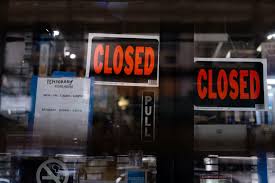The U.S. economy lost 701,000 jobs in March, snapping a decade-long record of employment growth, as strict measures to contain the coronavirus pandemic shuttered businesses and forced Americans to stay at home.
It was the first decline in payrolls since September 2010, and the steepest since March 2009, in the midst of the Great Recession.
The unemployment rate jumped to 4.4 percent, up from a half-century low of 3.5 percent in February.
Restaurants, bars, hotels, airlines, cruise lines, automakers and entertainment venues have been hit hard by the pandemic as a growing number of jurisdictions have ordered the closure of nonessential businesses and directed residents to stay at home.
But the Labor Department’s employment report, which is based on surveys conducted in the early weeks of the month, when large swaths of the economy had not yet shut down, does not fully reflect the depth of the economic calamity that the virus outbreak has inflicted. In the final two weeks of the month, 10 million Americans applied for unemployment benefits, a stunning sign of the scope of the economic crash.
“Much bigger job losses are coming,” said Mark Zandi, Moody’s chief economist, during a conference call with reporters earlier this week. He estimated that between 10 to 15 million jobs could disappear from the economy as a result of the outbreak, with the worst taking place in April.
The U.S. has the highest number of confirmed cases of COVID-19, the respiratory illness caused by the novel coronavirus, with more than 245,573 people infected, according to Johns Hopkins University data. More than 6,000 people in the country have died from the virus.
Estimates vary drastically for how high unemployment will climb, but economists broadly agree that it will be grim. An analysis published by the Federal Reserve Bank of St. Louis last week projected that unemployment could hit 32 percent in the second quarter as more than 47 million workers are laid off because of the pandemic. That would exceed the 24.9 percent peak during the Great Depression.
This is a developing story. Please check back for updates.


Leave A Comment
You must be logged in to post a comment.